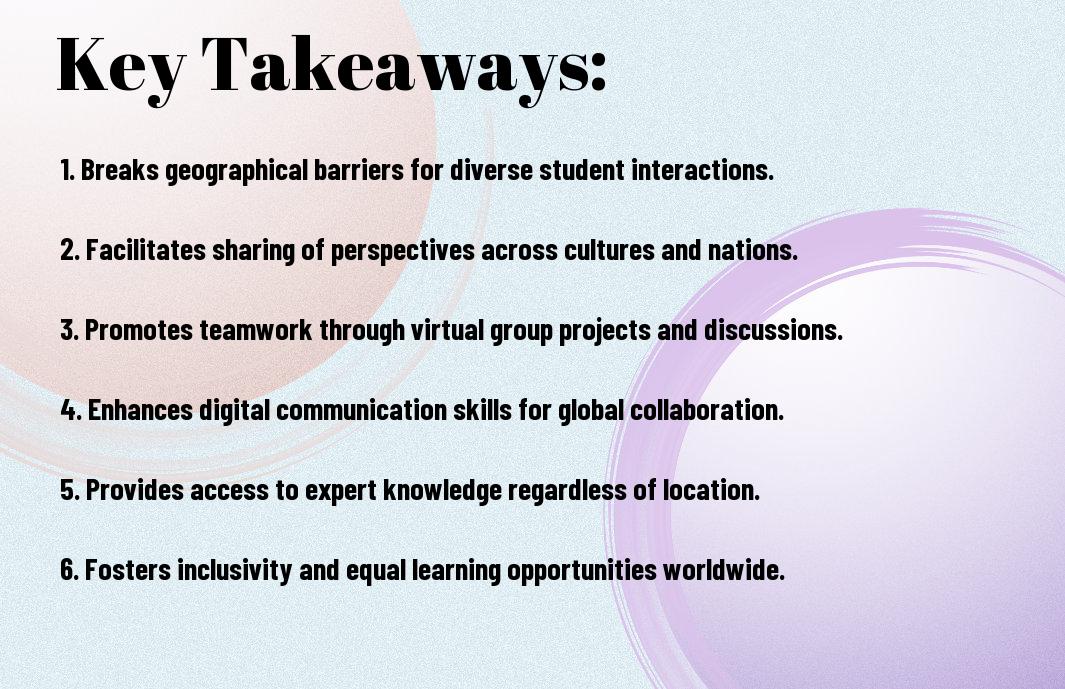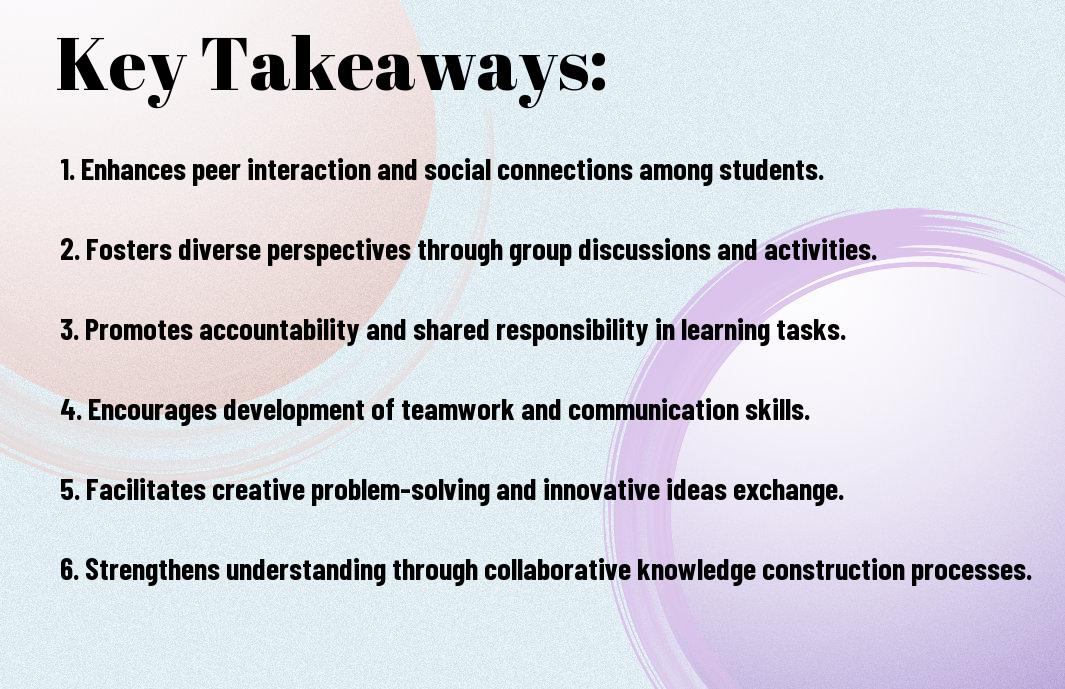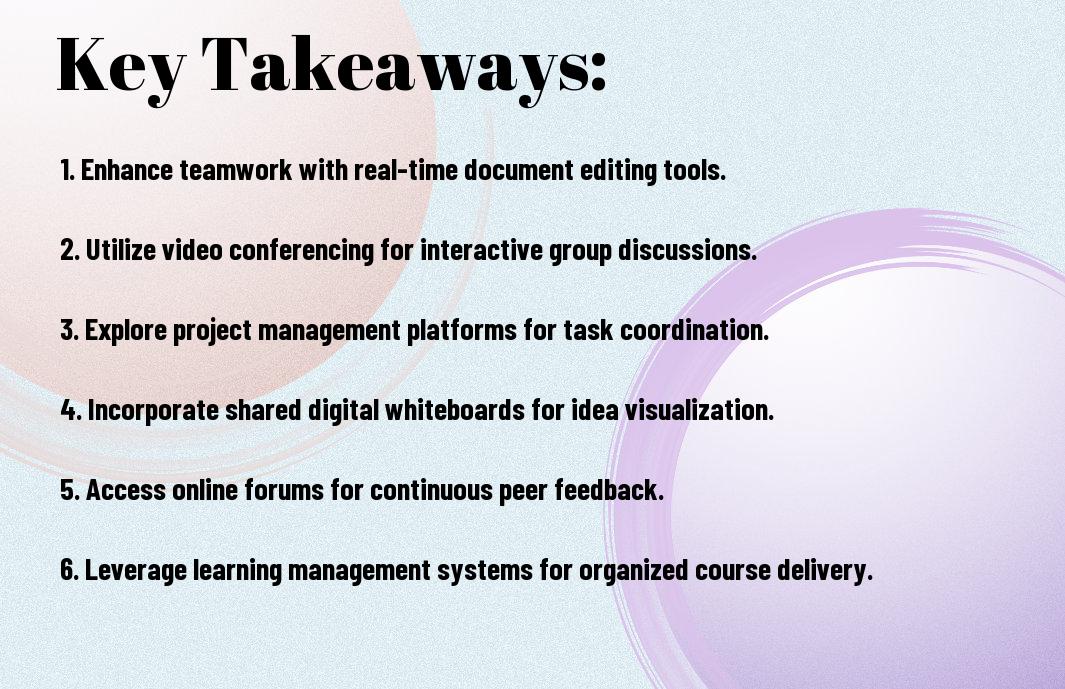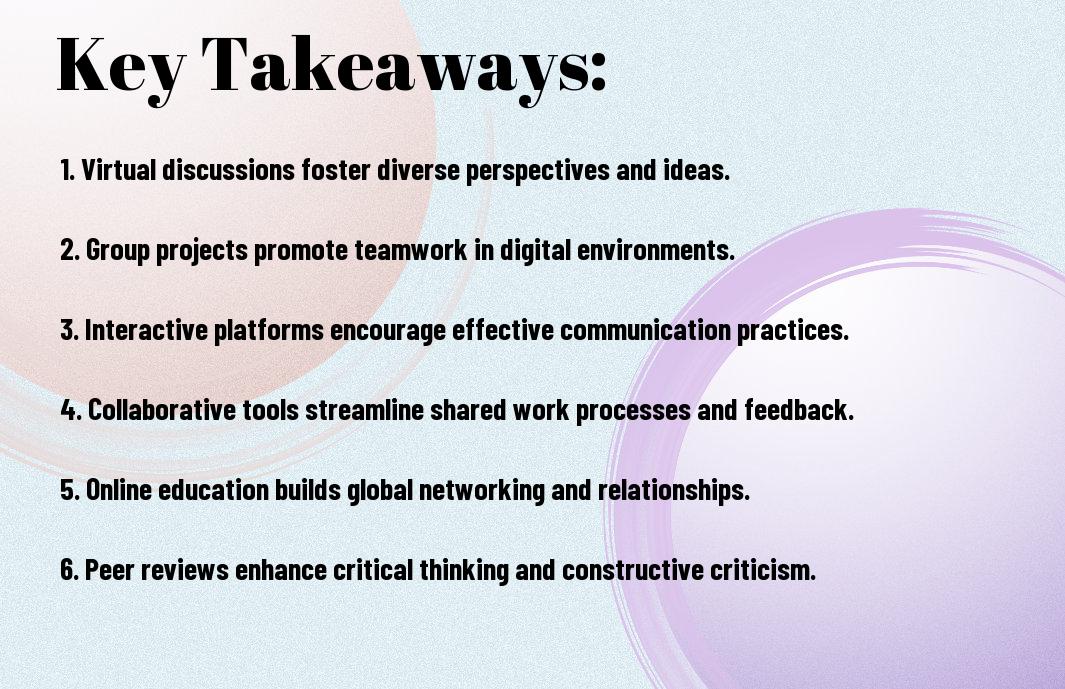As you initiate on online group projects, you’ll need to develop skills to collaborate effectively with your team. You can achieve success by learning to communicate, manage tasks, and leverage technology. For valuable insights, you can visit Tips for Group Projects Success in Online Classes to enhance your approach. By following expert advice, you’ll be well-equipped to handle the challenges of online group work and deliver outstanding results.
Key Takeaways:
To effectively manage and complete online group projects, consider the following points:
- Establish a clear communication plan to ensure all team members are informed and aligned with the project’s objectives and deadlines.
- Define each member’s roles and responsibilities to avoid confusion and overlapping work, promoting a smooth workflow.
- Utilize collaboration tools and platforms to facilitate real-time communication, file sharing, and progress tracking.
- Foster a positive and inclusive team environment by encouraging open discussion, respectful feedback, and active participation from all members.
- Set milestones and check-ins to monitor the project’s progress, identify potential issues, and make adjustments as needed to ensure a successful outcome.
Setting Up for Success
To master online group projects, you need to start by setting yourself up for success. You can find helpful tips and resources on How to manage online group projects – Trevecca Blog, which will guide you through the process.
Defining Project Goals and Objectives
Achieving clarity on your project’s objectives is vital. You will need to define what you want to accomplish and ensure your goals are specific, measurable, and attainable, allowing you to stay focused throughout the project.
Establishing Communication Channels
The foundation of a successful online group project lies in effective communication. You should establish clear channels for your team to collaborate, share ideas, and address concerns, making it easier to work together seamlessly.
Goals of effective communication include ensuring all team members are informed and aligned with the project’s progress. You will need to choose the right tools, such as video conferencing software, messaging apps, or project management platforms, to facilitate open and regular communication among team members, helping you to avoid misunderstandings and stay on track.
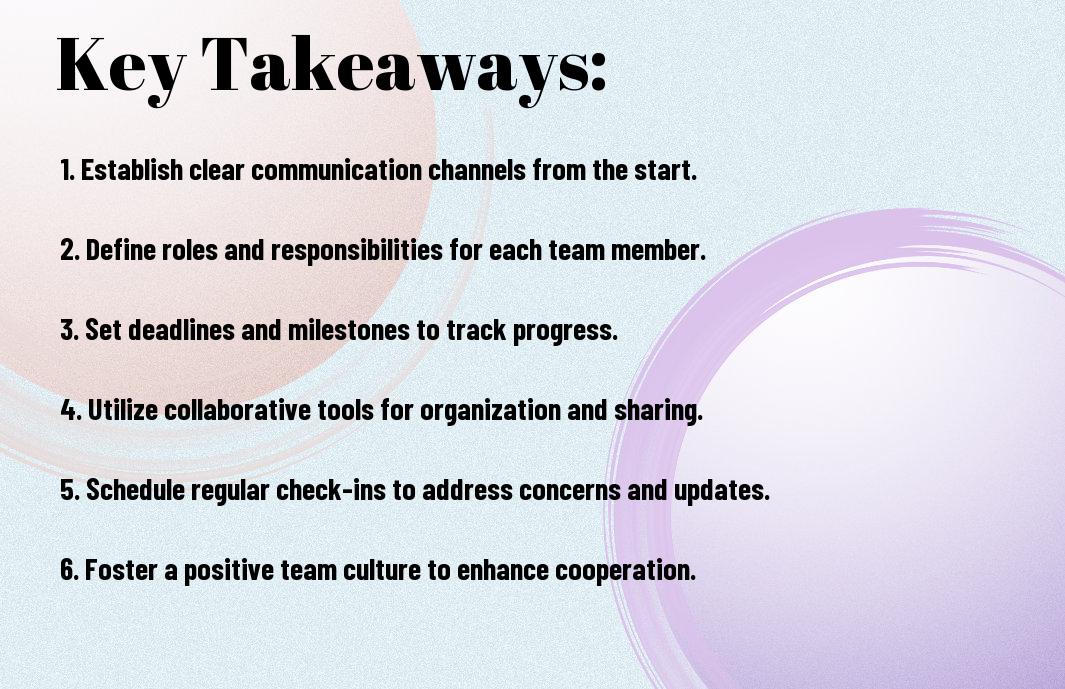
Team Collaboration
While working on online group projects, you will need to develop a cohesive unit that can effectively communicate and collaborate to achieve your goals. Your team’s success relies on the ability to share ideas, delegate tasks, and work together seamlessly.
Assigning Roles and Responsibilities
Betwixt the initial stages of your project, you should define each member’s role and responsibilities to avoid confusion and overlapping work. Your clear understanding of each task will help you stay organized and focused on your objectives.
Building Trust and Accountability
By fostering an environment of open communication, you can establish a foundation for trust and accountability within your team. Your ability to rely on each other will significantly impact the overall success of your project.
Plus, when you prioritize building trust and accountability, you can encourage team members to take ownership of their work, provide constructive feedback, and support each other in overcoming challenges, ultimately leading to a more productive and successful online group project experience.
Effective Time Management
Despite the challenges of online group projects, you can achieve success with proper time management. You will be able to prioritize tasks, allocate time, and meet deadlines, ensuring your project’s success.
Creating a Project Schedule
By establishing a schedule, you set clear expectations and milestones for your team, helping you stay on track and focused on your goals.
Meeting Deadlines and Milestones
One way to ensure your project’s success is by meeting deadlines and milestones, which helps you stay motivated and directed throughout the project.
Even when working on complex tasks, you can break them down into smaller, manageable chunks, and allocate specific time slots for each task, allowing you to make steady progress and meet your deadlines, thereby ensuring your project stays on track and you achieve your objectives.
Overcoming Challenges
After encountering obstacles in your online group project, you will need to develop strategies to overcome them. You must be proactive and flexible to ensure the project’s success.
Managing Conflicts and Disagreements
On occasion, you will face disagreements with your team members, and you should address these issues promptly. You can resolve conflicts by communicating effectively and finding common ground.
Adapting to Changes and Setbacks
An ability to adapt to changes and setbacks is imperative for the success of your online group project. You should be prepared to adjust your plan and make necessary adjustments.
And as you adapt to changes and setbacks, you will find that your project becomes more resilient and better equipped to handle unexpected challenges. You will need to assess the situation, adjust your strategy, and communicate the changes to your team, ensuring that everyone is on the same page and working towards the same goal, which will help you to successfully complete your online group project.
Staying Organized
For successful online group projects, you need to prioritize organization to ensure all tasks are completed efficiently. This involves creating a schedule, setting deadlines, and assigning roles to each team member.
Using Productivity Tools and Software
Across various platforms, you can find numerous tools to help manage your project, such as Trello or Asana, which enable you to track progress and collaborate with your team effectively.
Maintaining a Shared Workspace
Beneath the surface of a successful project lies a well-organized shared workspace, where you can store and access all project-related files and information, making it easily accessible to all team members.
Organized files and folders in your shared workspace allow you to quickly locate specific documents, reducing time spent searching and increasing productivity, enabling you to focus on completing tasks and meeting deadlines, and ultimately contributing to the success of your online group project.

Evaluating Progress
Not all group projects are alike, and evaluating progress is key to success. You need to assess your team’s performance and adjust your strategy as needed to ensure your project stays on track.
Tracking Performance and Progress
Beneath the surface of your project, lies a complex web of tasks and deadlines. You will need to establish a system to track progress, allowing you to identify areas that require improvement and make adjustments accordingly.
Providing Feedback and Support
Above all, your goal is to support your team members in achieving their goals. You should provide regular feedback, both positive and constructive, to help your team stay motivated and focused.
At this stage, you should be paying close attention to your team’s dynamics, identifying strengths and weaknesses, and providing guidance where needed. You will need to balance giving feedback with offering support, to ensure your team feels empowered to take ownership of their work and make progress towards your shared goals.
Summing up
Hence, you now have the tools to master online group projects. You have learned to communicate effectively, manage tasks, and collaborate with your team. By applying these skills, you will successfully complete your projects and achieve your goals. Your ability to work efficiently in a virtual environment will make you a valuable asset to any team, and you will be well-equipped to tackle any online group project that comes your way.
FAQ
Q: What are the initial steps to take when starting an online group project?
A: When beginning an online group project, it’s vital to first establish clear communication channels. This can be done by setting up a shared online workspace or platform where all team members can collaborate, share files, and engage in discussions. Define the project’s objectives, roles, and responsibilities of each team member to ensure everyone is on the same page. Additionally, develop a project schedule and timeline, including milestones and deadlines, to guide the team’s progress and ensure timely completion.
Q: How can team members effectively collaborate and manage their tasks in an online group project?
A: Effective collaboration in an online group project requires the use of appropriate tools and strategies. Utilize project management tools such as Trello, Asana, or Basecamp to assign tasks, track progress, and set deadlines. Regular virtual meetings, whether through video conferencing tools like Zoom or Skype, are also vital for discussing project updates, addressing challenges, and aligning the team’s efforts. Moreover, encourage open communication among team members, foster a collaborative environment, and embrace diverse perspectives to leverage the strengths of each member and produce a high-quality outcome.
Q: What strategies can be employed to handle conflicts or disagreements within an online group project team?
A: Conflicts or disagreements can arise in any team setting, including online group projects. To manage these issues, it’s important to address them promptly and professionally. Establish a clear conflict resolution process at the outset of the project, outlining how disagreements will be handled. Encourage team members to express their concerns respectfully and listen to each other’s viewpoints. Mediation by a neutral party or a team leader can also be beneficial in resolving disputes. Furthermore, focusing on the project’s goals and the shared interest in its success can help team members navigate through challenges and maintain a productive working relationship.

